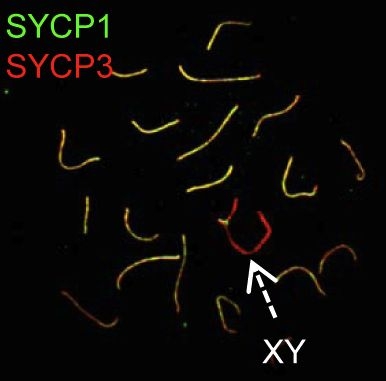 Harvard Stem Cell Institute (HSCI) researchers have found a link between male infertility and a mutation in a gene critical for sperm production. If the gene, Elongator Protein 1/Inhibitor of KappaB Kinase-associated Protein (Elp1/IKAP), is turned off, male germ cells – which give rise to sperm – encounter errors during division. “Basically, the germ cells cannot go through meiosis,” the process by which offspring are assigned sets of chromosomes from their parents, said HSCI Principal Faculty member Yi Zhang, PhD, a Harvard Medical School Professor of Pediatrics and Genetics at Children’s Hospital Boson.
Harvard Stem Cell Institute (HSCI) researchers have found a link between male infertility and a mutation in a gene critical for sperm production. If the gene, Elongator Protein 1/Inhibitor of KappaB Kinase-associated Protein (Elp1/IKAP), is turned off, male germ cells – which give rise to sperm – encounter errors during division. “Basically, the germ cells cannot go through meiosis,” the process by which offspring are assigned sets of chromosomes from their parents, said HSCI Principal Faculty member Yi Zhang, PhD, a Harvard Medical School Professor of Pediatrics and Genetics at Children’s Hospital Boson.
Zhang and his Zhang and his postdoctoral fellow Fu-Jung Lin, PhD, became interested in the Elp1/IKAP protein because it is conserved, or relatively unchanged, in all eukaryotes, suggesting biological importance. The researchers inactivated the gene specifically in germ cells, from which both sperm and oocytes are generated, and found that mice produced no offspring. Further analysis revealed that the mutant mice generated no sperm due to a meiotic defect. The results led Zhang to believe that the deletion of the gene causes male infertility. “We revealed a novel biologic function of the Elp1/IKAP,” he said.
The research could potentially explain some cases of human infertility. Elp1/IKAP has also been linked to a human nervous system disease that results in insensitivity to pain and the inability to produce tears, called familial dysautonomia. “It might be interesting to see whether patients with this disease also have a fertility problem,” Zhang said.
The National Institutes of Health supported this research.
Source: Ikbkap/Elp1 Deficiency Causes Male Infertility by Disrupting Meiotic Progression. PLOS Genetics. May 23, 2013.
Photo: A meiotic defect caused by a mutated elp1/ikap gene. (Credit: Yi Zhang/PLOS Genetics)
